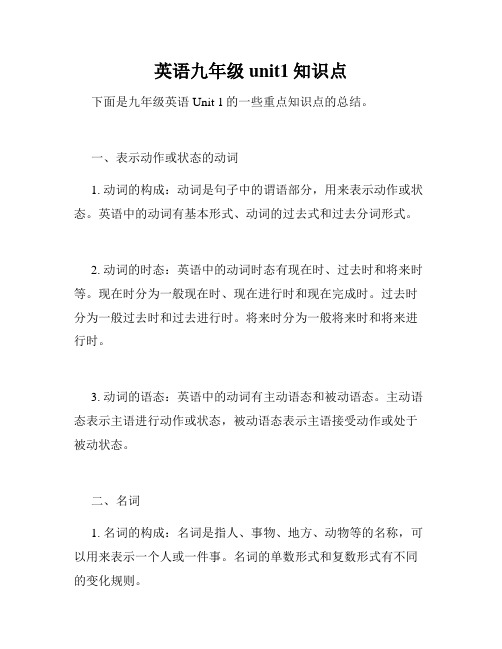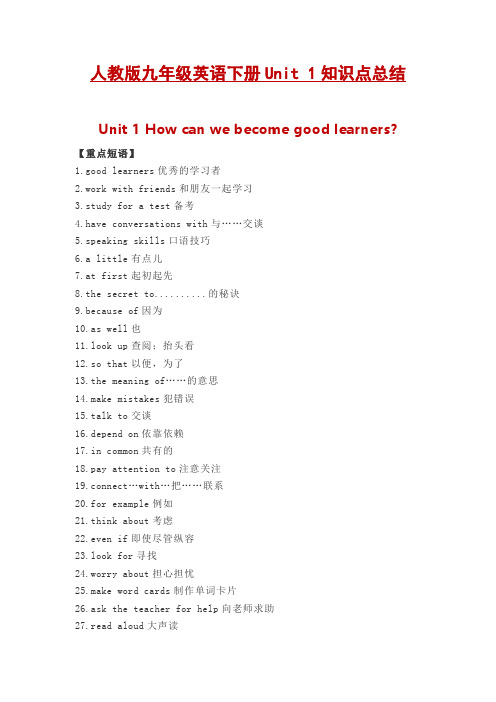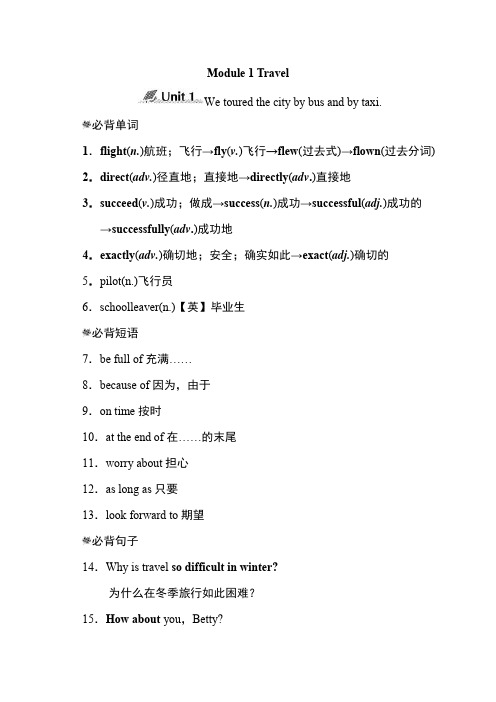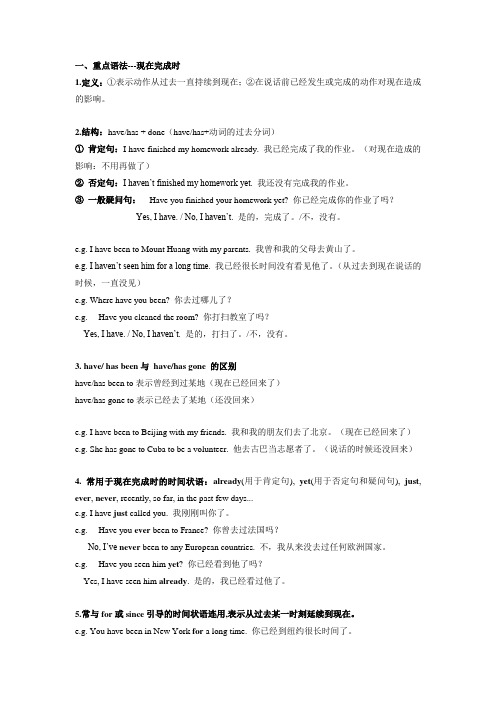九年级英语下册第一单元知识点
人教版九年级下学期英语教学第一单元知识点整理

九年级英语第一单元教学知识点梳理Unit 1 How can we become good learners? 短语整理•look up (在词典、参考书中或通过电脑)查阅;抬头看•be born with 天生具有•pay attention to 注意;关注•connect … with 把……和……连接或联系起来•good learners 优秀的学习者•work with friends 和朋友一起学习•ask … for help 向……寻求帮助•study for a test 备考•work with a group 小组合作•have conversations with 与……交谈• a little 有点儿;一点点•be afraid of 害怕……•take notes 记笔记•depend on 取决于……•in common 共有的•word by word 一个词一个词地•fall in love with 爱上……用法讲解•look up (在词典、参考书中或通过电脑)查阅;抬头看o查字典:Look up the meaning of this word in the dictionary.o抬头看:He was sipping coffee and did not look up.o look for: 寻找▪We are looking for a new restaurant.o look into: 深入地检查;调查▪They are coming to look into this issue. 他们来调查这个问题。
o look forward to: 期望▪I look forward to your reply. 我期待你的答复。
•be born with 天生具有o She is born with this disability. 她生来就有这样的残疾。
英语九年级unit1知识点

英语九年级unit1知识点下面是九年级英语Unit 1的一些重点知识点的总结。
一、表示动作或状态的动词1. 动词的构成:动词是句子中的谓语部分,用来表示动作或状态。
英语中的动词有基本形式、动词的过去式和过去分词形式。
2. 动词的时态:英语中的动词时态有现在时、过去时和将来时等。
现在时分为一般现在时、现在进行时和现在完成时。
过去时分为一般过去时和过去进行时。
将来时分为一般将来时和将来进行时。
3. 动词的语态:英语中的动词有主动语态和被动语态。
主动语态表示主语进行动作或状态,被动语态表示主语接受动作或处于被动状态。
二、名词1. 名词的构成:名词是指人、事物、地方、动物等的名称,可以用来表示一个人或一件事。
名词的单数形式和复数形式有不同的变化规则。
2. 可数名词和不可数名词:可数名词可以用数词或冠词来修饰;不可数名词通常不能与数词连用,只能用量词来表示。
三、形容词和副词1. 形容词的构成:形容词是用来表示事物性质或状态的词汇,可以修饰名词或代词。
2. 副词的构成:副词是用来修饰动词、形容词或其他副词的词汇,用来表达程度、方式或时间。
大部分副词是通过在形容词后面加上-ly构成。
四、代词1. 人称代词:人称代词分为主格和宾格两种形式。
主格代词作主语,宾格代词作宾语。
2. 物主代词:物主代词用来表示所属关系,包括形容词性物主代词和名词性物主代词。
3. 反身代词:反身代词用作宾语,表示某人自己做某事。
五、冠词和介词1. 冠词的用法:冠词分为定冠词和不定冠词,用来限定名词。
定冠词有the,不定冠词有a和an。
2. 介词的用法:介词用来表示名词或代词与其他单词之间的关系,常用于表示时间、地点、方向、目的等。
六、连接词和从句1. 连接词的分类:连接词分为并列连词、关系连词和从属连词。
并列连词用来连接两个相同的成分,关系连词用来引导定语从句,从属连词用来引导时间、条件、原因、目的、方式、结果等从句。
2. 从句的种类:从句分为名词性从句、定语从句和状语从句。
九年级下册英语知识点

九年级下册英语知识点Module1 TravelUnit1 We toured the city by bus and by taxi、1、 welcome back 欢迎回来2、 not bad 还不错3、 be full of 充满 =be filled with4、 over = more than 超过、多于5、 because of + 名词/代词/动名词because+句子6、 fly back to +地名飞回某地7、 a bit late 有点晚a bit of + 不可数名词8、 fly direct to Hong Kong 直飞香港9、 succeed in doing sth、成功做某事10、 take a boat to sp、 = go to sp、 by boat 坐船去某地11、 have quite a good time 玩得很高兴quite a / an + adj、 + n、 = a very adj、 + n、quite a nice boy = a very nice boy12、 tour the city v、 = take a tour to the city n、环城市旅行13、 go for a walk 去散步14、 had better do sth、最好做某事15、 at the end of the term 在学期末16、 nothing to worry about 没什么可担心的17、 as long as 只要; 和…一样长18、 the school-leavers’ party 毕业生晚会19、 look forward to+ sth、 / doing sth、盼望 (做)某事Unit2 It’s a long story、1、 say goodbye to sb、向某人告别say hello to sb、向某人问候2、 take care 多保重care for 喜欢care about 关心take care = be careful 小心、注意take care of sb、 / sth、照顾某人 / 保管某物3、 get on 上(车) get off 下(车)4、 be afraid +that从句: 恐怕be afraid of +名词/代词/动名词: 害怕/担心be afraid to do sth、害怕做某事5、take one’s seat 就坐;坐某人的座位6、 have /get sth、 ready: 把某物准备好Please have your tickets ready、请把票准备好。
译林版九年级下册英语unit1知识点

译林版九年级下册英语unit1知识点Unit 1: The World of Our Senses —— Exploring the Astonishing Capabilities of Our Five SensesIntroductionOur senses play a vital role in our daily lives. They allow us to experience the world around us, communicate with others, and make sense of our surroundings. In this unit, we will delve into the fascinating world of our senses and explore their astonishing capabilities.Section 1: The Power of SightOur sense of sight is arguably one of the most important senses. Through our eyes, we are able to perceive colors, shapes, and movement. However, our vision goes beyond mere observation. It is responsible for our ability to express emotions, recognize faces, and absorb information from our environment. Scientists have found that our eyes can detect approximately 10 million colors, enabling us to experience the beauty of the world in all its vibrancy.Section 2: The Magic of HearingOur sense of hearing allows us to perceive sounds and interpret them. It not only enables us to communicate with others through speech and language but also allows us to appreciate the melody of music. Fascinatingly, our ears are capable of detecting sounds as low as 20 Hz and as high as 20,000 Hz. This wide range of auditory perception is what enables us to differentiate between different pitches and tones.Section 3: The Marvel of Taste and SmellThe senses of taste and smell are closely linked and often work together to enhance our sensory experiences. Our taste buds, located on our tongues, can detect the five basic tastes: sweet, sour, salty, bitter, and umami. On the other hand, our sense of smell can detect countless odors, triggering memories and influencing our emotions. Together, taste and smell allow us to savor delicious flavors and appreciate the aromas that surround us.Section 4: The Importance of TouchOur sense of touch enables us to perceive physical sensations and textures. It plays a crucial role in our interaction with the world, providing us with information about temperature, pressure, pain, and pleasure. Our skin, which contains millions of sensory receptors, allows us to experience the sensations of softness, roughness, heat, and cold.Without our sense of touch, our perception of the world would be greatly diminished.Section 5: The Intricacies of the Sixth SenseWhile we commonly refer to the five senses, there is ongoing research into the existence of a sixth sense. This mystical sense is believed to allow us to perceive things beyond the reach of our other senses, such as sensing someone watching us when we cannot see them. While the concept of a sixth sense remains shrouded in mystery, it adds an element of intrigue to the world of our senses.ConclusionOur senses are truly captivating, allowing us to experience the wonders of the world and navigate through life. Through our eyes, ears, nose, mouth, and skin, we gain a profound understanding of our surroundings. We should take the time to appreciate and nurture our senses, as they are the key to our connection with the world and with others. So, let's embrace the incredible capabilities of our senses and continue exploring the remarkable depths of our sensory experiences.。
新目标英语九年级下第一单元知识点汇总

新目标英语九年级下第一单元知识点汇总本文档汇总了新目标英语九年级下册第一单元的重要知识点,并提供相关示例和解释。
1. 名词性从句名词性从句是在句子中充当名词的从句。
它可以作主语、宾语、表语或同位语。
名词性从句常用的引导词有:that、whether、if、who、whom、whose、which、what、when、where、why、how 等。
例句:- Can you tell me when the movie starts?- She asked me where I was going.2. 时态与语态在英语中,时态和语态是表达动作的两个重要方面。
2.1 时态英语中的时态分为过去时、现在时和将来时,每个时态又有不同的形式和用法。
过去时的构成:- 一般过去时: 动词过去式(如:played)- 过去进行时: was/were + 动词的现在分词(如:was playing)- 过去完成时: had + 动词的过去分词(如:had played)- 过去将来时: would + 动词原形(如:would play)2.2 语态英语中的语态分为主动语态和被动语态。
主动语态:主语是动作的执行者。
主语是动作的执行者。
被动语态:主语是动作的承受者。
主语是动作的承受者。
例句:- He played the guitar last night.(主动语态)- The guitar was played by him last night.(被动语态)3. 动词的不定式动词的不定式是动词的一种形式,常由 "to + 动词原形" 构成。
它可以作主语、宾语、表语、定语或状语。
例句:- To learn English well is my goal.(作主语)- She wants to go shopping with her friends.(作宾语)4. 宾语从句宾语从句是充当宾语的从句。
九年级英语第1单元-知识点总结

九年级英语第1单元-知识点总结第一部分:基础词汇和短语1. Greetings and Introductions在英语中,问候和介绍是日常生活中常用到的交际用语。
常见的问候方式包括:“Hello!”、“Hi!”、“Goodmorning/afternoon/evening!”等。
而自我介绍的常用表达为“I am...”、“My name is...”等。
2. Classroom English在教室里,学生和老师之间的交流需要使用一些特定的英语表达。
例如,“May I come in?”、“May I go to the washroom?”、“Can you repeat that, please?”等。
3. Numbers and Dates数字和日期是我们日常生活中无法绕开的内容。
需要掌握基本的数字、基数词、序数词等,以及日期的表达,例如“Today is...”、“It's Monday.”、“My birthday is on October 15th.”等。
4. Time谈论时间也是英语学习的重要内容,掌握“in themorning/afternoon/evening”、“at 9 o'clock”、“from...to...”等表达方式非常实用。
5. School Subjects and Facilities学校科目和设施是我们在学校中经常需要提及的。
诸如“Mathematics”、“Science”、“Library”、“Computer lab”等词汇需要熟练掌握。
6. Adjectives and Adverbs形容词和副词是用来描述人、事物和行为的重要词汇。
例如“beautiful”、“kind”、“quickly”、“carefully”等。
第二部分:语法知识点1. Simple Present Tense学习现在时态是英语学习的基础。
在这一时态中,主语和动词的形式要保持一致,例如“I play football.”、“He dances well.”。
新版九年级下unit1知识清单

九下unit1 知识清单1.Wow, the Great Wall is amazing, isn’t it ?哇,长城真壮观啊,不是吗?反意疑问句:陈述句加一个疑问句构成。
基本结构:当陈述句用肯定形式时,附加疑问句部分用be动词、助动词或情态动词的否定形式;(前肯后否)当陈述句是否定形式时,附加疑问句用肯定形式。
This is your book, isn’t it? Jim likes English, doesn’t he?He hardly goes to school by car, _________ he?特殊结构:Let’s……, shall we? Let us ……, will you?(前否后肯型反意疑问句:He isn’t Chinese, is he? 他不是中国人,对吗?Yes,he is. 不,他是。
(前后的一致性)2.It is tiring to climb the step. 爬这些台阶真累人。
tire-------tiring 使人疲劳用来形容事物------tired 感到疲劳主语通常是人表人的感受I felt very tired after finishing the tiring work. 完成这件累人的工作后我感到很疲劳。
类似的还有:interested/interesting bored/ boring moved/ moving amazed/amazing 3.We’d better keep moving. 我们最好继续前进。
keep doing sth. 继续做某事,可与keep on doing sth.换用初中关于keep 结构:1)keep sb. from doing sth.阻止某人做某事The rain kept us from going out. 雨阻止了我们外出。
2)keep sb. doing sth. 使某人一直做某事The boss kept the farmers working all day. 老板让农民整天地工作。
人教版九年级英语下册Unit 1知识点总结

人教版九年级英语下册Unit 1知识点总结Unit 1 How can we become good learners? 【重点短语】1.good learners优秀的学习者2.work with friends和朋友一起学习3.study for a test备考4.have conversations with与……交谈5.speaking skills口语技巧6.a little有点儿7.at first起初起先8.the secret to..........的秘诀9.because of因为10.as well也11.look up查阅;抬头看12.so that以便,为了13.the meaning of……的意思14.make mistakes犯错误15.talk to交谈16.depend on依靠依赖17.in common共有的18.pay attention to注意关注19.connect…with…把……联系20.for example例如21.think about考虑22.even if即使尽管纵容23.look for寻找24.worry about担心担忧25.make word cards制作单词卡片26.ask the teacher for help向老师求助27.read aloud大声读28.spoken English英语口语29.give a report作报告30.word by word一字一字地31.so……that如此……以至于32.fall in love with爱上33.something interesting有趣的事情34.take notes记笔记35.how often多久一次36.a lot of许多37.the ability to do sth.做某事的能力38.learning habits学习习惯39.be interested in对……感兴趣40.get bored感到无聊【重点句型】1.提建议的句子:①What/how about+doing sth.?做…怎么样?如:What/How about going shopping?②Why don't you+do sth.?你为什么不做…?如:Why don't you go shopping?③Why not+do sth.?为什么不做…?如:Why not go shopping?④Let's+do sth.让我们做…吧。
九年级下册英语unit1知识点总结

九年级下册英语unit1知识点总结九年级下册英语Unit 1 知识点总结【一、时态】在Unit 1中,我们学习了一些与时态有关的知识点。
英语的时态分为一般现在时、一般过去时、一般将来时等。
时态的运用需要根据具体的情景和时间点来进行选择。
1. 一般现在时:表示现在经常性、习惯性的动作或状态。
例如:I usually go to bed early.(我通常早点上床睡觉。
)2. 一般过去时:表示过去发生的动作或状态。
例如:We visited the museum yesterday.(昨天我们参观了博物馆。
)3. 一般将来时:表示将来要发生的动作或状态。
常与表示将来的时间状语连用,如tomorrow(明天)、next week(下周)等。
例如:I will go shopping with my friends tomorrow.(我明天要和朋友们一起去购物。
)【二、被动语态】被动语态是英语中的一种表达方式,常用于强调动作的接受者。
它的结构是“be + 过去分词”。
在Unit 1中,我们学会了如何将一个句子从主动语态转换为被动语态。
例如:主动语态:They clean the classroom every day.(他们每天打扫教室。
)被动语态:The classroom is cleaned every day.(教室每天被打扫。
)在被动语态中,动作的执行者通常不被强调,而强调的是动作的承受者。
所以,我们在理解句子时需要注意上下文的语境。
【三、同义词与反义词】在Unit 1的学习中,我们还遇到了一些同义词与反义词。
同义词指的是具有相同或类似意义的词语,而反义词则指意义相反的词语。
1. 同义词:在英语中存在着许多同义词,比如说“happy”(高兴)和“glad”(高兴),这两个词是同义词。
2. 反义词:反义词是指意义相反的词语,比如说“hot”(热)和“cold”(冷),这两个词是反义词。
通过学习同义词和反义词,我们可以丰富我们的词汇量,提高我们的语言表达能力。
外研版九年级英语下册Module 1 Travel 模块知识点归纳

Module 1 TravelWe toured the city by bus and by taxi.必背单词1.flight(n.)航班;飞行→fly(v.)飞行→flew(过去式)→flown(过去分词) 2.direct(adv.)径直地;直接地→directly(adv.)直接地3.succeed(v.)成功;做成→success(n.)成功→successful(adj.)成功的→successfully(adv.)成功地4.exactly(adv.)确切地;安全;确实如此→exact(adj.)确切的5.pilot(n.)飞行员6.schoolleaver(n.)【英】毕业生必背短语7.be full of充满……8.because of因为,由于9.on time按时10.at the end of在……的末尾11.worry about担心12.as long as只要13.look forward to期望必背句子14.Why is travel so difficult in winter?为什么在冬季旅行如此困难?15.How about you,Betty?你呢,贝蒂?16.But now,we'd better get back to work.但是现在,我们最好回到学习中去。
It's a long story.必背单词1.sir(n.)先生;长官→Mr.(同义词)先生2.officer(n.)军官;官员;警察→office(n.)办公室3.stupid(adj.)笨的;糊涂的→clever(adj.)(反义词)聪明的4.jacket(n.)短上衣;夹克必背短语5.say goodbye to向……说再见6.each other互相7.look for寻找8.go past经过9.talk to…和……交谈10.take off脱去必背句子11.Let's have a look at your ticket.咱们看看你的票吧。
人教版英语九年级下册unit1知识点

人教版英语九年级下册unit1知识点Unit 1: A better lifeLiving in a fast-paced world, it becomes more and more important for us to embrace a better life. In Unit 1 of the People's Education Edition of 9th grade English textbook, we will explore various aspects of life and learn how we can improve our well-being. Let's delve into the key points of this unit.1. Vocabulary and expressions:To build a solid foundation for language learning, it is essential to grasp the vocabulary and expressions related to the topic. In this unit, we will learn words and phrases that revolve around happiness, health, and personal growth. By expanding our vocabulary, we can effectively communicate our thoughts and feelings, as well as comprehend English texts, both written and spoken.2. Grammar:While vocabulary helps us express ideas, grammar provides the structure and coherence to our sentences. In Unit 1, we will focus on verb tenses, especially the use of present perfect and simple past tense. By understanding these tenses and their applications, we can accuratelydescribe past actions and experiences, as well as connect these experiences to the present.3. Listening and speaking:Improving our listening and speaking skills is crucial to effective communication. Unit 1 offers opportunities to develop these skills through various listening exercises and interactive speaking activities. By practicing and actively engaging in these tasks, we can enhance our ability to comprehend spoken English and express our ideas fluently.4. Reading and writing:Reading is not only enjoyable but also a valuable tool for language learning. This unit presents thought-provoking texts that explore different aspects of leading a better life. Through reading and analysis, we can broaden our perspectives and gain insight into different cultures and ways of thinking.Furthermore, writing is an essential skill that enables us to effectively convey our thoughts and opinions. In Unit 1, we will learn to write informal letters and express our appreciation and gratitude to others. Through practicing our writing skills, we can become more proficient in expressing ourselves in written English.5. Culture corner:In each unit, the Culture Corner section provides us with insights into the diverse cultures and customs around the world. By exploring these cultural aspects, we can appreciate the rich diversity of humanity and develop a broader understanding of different societies.In conclusion, Unit 1 of the People's Education Edition of 9th grade English textbook offers a comprehensive approach to acquiring language skills and understanding different aspects of a better life. By mastering the vocabulary, grammar, listening, speaking, reading, and writing skills presented in this unit, we can improve our overall language proficiency and enhance our ability to lead a better life.。
九年级下册英语第一单元知识点

九年级下册英语第一单元知识点
九年级下册英语第一单元的知识点包括:
1. 词汇和短语:学习并掌握单元中出现的生词和短语,这些词汇和短语涉及到日常生活中的各种主题,如旅行、文化、历史等。
2. 语法:掌握单元中出现的语法知识点,如现在完成时、一般过去时、被动语态等。
3. 阅读理解:通过阅读单元中的文章,提高阅读理解能力,同时学习如何从文章中获取信息,理解作者的观点和态度。
4. 写作:学习不同类型的写作,如描述性写作、说明性写作等,通过写作练习提高英语表达能力。
5. 听力和口语:通过听力练习提高听力理解能力,通过口语练习提高英语口语表达能力。
6. 文化背景知识:了解单元中出现的文化背景,如不同国家的习俗、传统、节日等,从而更好地理解英语语言和文化。
要学好这个单元,建议多读多写,多做练习题,同时注重听说能力的培养。
如果有条件,可以与母语为英语的人交流,以提高自己的英语水平。
九年级下一单元知识点英语

九年级下一单元知识点英语Unit: English Knowledge Points in Grade 9 – Semester 2Introduction:English is a crucial subject for students in grade 9. In this unit, we will explore various knowledge points that will enhance our understanding and proficiency in the English language. These key topics include grammar, vocabulary, speaking, listening, reading, and writing skills. Let us delve into these knowledge points and gain a deeper understanding.1. Grammar:Grammar forms the foundation of any language. In grade 9, we will focus on the following grammar topics:- Verb Tenses: Present, Past, Future, Present Perfect, Past Perfect, Future Perfect.- Nouns: Common, Proper, Countable, Non-countable.- Pronouns: Personal, Possessive, Reflexive, Demonstrative.- Adjectives and Adverbs: Describing and modifying words.- Prepositions: Showing relationships between words.- Conjunctions: Joining words, phrases, or clauses.- Sentence Structure: Simple, Compound, Complex.- Direct and Indirect Speech: Reporting spoken words.2. Vocabulary:Expanding our vocabulary is essential to improve our communication skills. In this unit, we will learn the following vocabulary-related aspects:- Synonyms and Antonyms: Understanding word relationships.- Homophones and Homographs: Words with similar sounds or spellings.- Idioms and Phrasal Verbs: Figurative expressions and verb phrases.- Word Formation: Creating words using prefixes, suffixes, and roots.- Collocations: Words that commonly go together.- Contextual Vocabulary: Understanding words through their context.3. Speaking and Listening Skills:Improving our speaking and listening skills enhances our ability to communicate effectively. This unit will focus on:- Pronunciation: Correctly pronouncing sounds, stress, and intonation.- Conversational Strategies: Initiating and maintaining conversations.- Narrative and Descriptive Speaking: Describing events, people, or experiences.- Active Listening: Understanding spoken words, ideas, and opinions.- Note-taking: Recording important information while listening.4. Reading Skills:Reading helps us explore different genres and improve our comprehension skills. In this unit, we will develop the following reading skills:- Skimming and Scanning: Quickly identifying main ideas and specific information.- Inference and Deduction: Interpreting information not explicitly stated.- Text Structure: Understanding how a text is organized.- Vocabulary in Context: Inferring word meanings from the surrounding text.- Critical Reading: Analyzing and evaluating the content.5. Writing Skills:Effective writing requires clarity, coherence, and creativity. This unit will focus on the following writing skills:- Paragraph Structure: Organizing ideas logically within a paragraph.- Narrative Writing: Composing stories with a clear beginning, middle, and end.- Descriptive Writing: Creating vivid descriptions using sensory details.- Expository Writing: Presenting information or explaining a concept.- Argumentative Writing: Presenting a viewpoint supported by evidence.- Editing and Proofreading: Reviewing and correcting errors in grammar, spelling, and punctuation.Conclusion:In grade 9, learning English encompasses a wide range of knowledge points. By expanding our grammar, vocabulary, speaking, listening, reading, and writing skills, we will become more proficient in communicating effectively. Let us embrace these knowledge points and strive for continuous improvement in our English language journey.。
九年级英语下册第一单元知识点总结

九年级英语下册第一单元知识点总结九年级英语下册第一单元知识1【重点短语】1. have conversation with sb. 同某人谈话2. too…to… 太……而不能3. the secret to… ……的秘诀4. be afraid of doing sth./ be afraid to do sth. 害怕做某事5. look up 查阅6. repeat out loud 大声跟读7. make mistakes in 在……方面犯错误8. connect ……with… 把……和……连接/联系起来9. get bored 感到厌烦10. be stressed out 焦虑不安的11. pay attention to 注意;关注12. depend on 取决于;依靠13. the ability to do sth.. 做某事的能力九年级英语下册第一单元知识2【考点详解】1. by + doing 通过……方式(by是介词,后面要跟动名词,也就是动词的ing形式)2. talk about 谈论,议论,讨论The students often talk about movie after class. 学生们常常在课后讨论电影。
talk to sb= talk with sb 与某人说话3. 提建议的句子:①What/ how about +doing sth.? 做…怎么样?(about后面要用动词的ing形式,这一点考试考的比较多)如:What/ How about going shopping?②Why don t you + do sth.? 你为什么不做…?如:Why don t you go shopping?③Why not + do sth. ? 为什么不做…?如:Why not go shopping?④Let s + do sth. 让我们做…...吧。
九年级下册英语u1知识点

九年级下册英语u1知识点Unit 1: English Grammar and Vocabulary for Grade 9In Unit 1 of the 9th-grade English textbook, you will explore various grammar rules and expand your vocabulary. This unit serves as a foundation for your English language skills and aims to enhance your understanding and usage of the language. Let's delve into the key knowledge points covered in this unit.I. Present Perfect TenseThe present perfect tense is used to express actions or states that occurred in the past but have a connection to the present. It is formed by using the auxiliary verb "have" or "has" with the past participle of the main verb. For example:- I have visited London several times.- She has already finished her homework.II. Reported SpeechReported speech is used to convey information or statements made by someone else. When reporting speech, we often need to change the tense, pronouns, and adverbs. For example:- Direct speech: "I will study for the exam," said Tom.- Reported speech: Tom said that he would study for the exam.III. Modal VerbsModal verbs are used to express possibility, ability, necessity, or obligation. Some common modal verbs include can, could, may, might, must, shall, should, will, and would. For example:- I can swim.- You should eat more fruits and vegetables.IV. Vocabulary ExpansionUnit 1 introduces a wide range of vocabulary to enrich your language skills. Some of the topics covered include travel, entertainment, education, and daily activities. It is crucial to familiarize yourself with these new words and their usage in various contexts.V. Reading ComprehensionThroughout Unit 1, you will encounter various reading passages that aim to enhance your reading comprehension skills. These passages cover different genres, such as articles, stories, and dialogues. It isessential to understand the main ideas, infer meaning from context, and analyze the text to improve your overall reading abilities.VI. Writing SkillsDeveloping writing skills is an integral part of this unit. You will learn how to write different types of texts, such as formal letters, informal emails, narratives, and descriptions. It is crucial to pay attention to grammar, vocabulary, and cohesive devices to producewell-structured and coherent written work.VII. Listening and Speaking PracticeTo improve your listening and speaking skills, you will engage in various activities throughout the unit, such as listening to dialogues, interviews, and speeches. These exercises will help you understand spoken English, recognize different accents, and enhance your ability to participate in conversations and discussions.In conclusion, Unit 1 of the 9th-grade English textbook covers essential grammar rules, vocabulary expansion, reading comprehension, writing skills, and listening and speaking practice. By thoroughly understanding and applying these knowledge points, you will strengthen your English language proficiency and become an effective communicator in both written and spoken English.。
译林九年级下册UNIT1知识点

译林九年级下册UNIT1知识点概览随着学业的不断深入,我们需要掌握更多的知识点来应对学习上的挑战。
本文将从译林九年级下册UNIT1的知识点出发,带你探索学习的广阔领域。
一、动词时态动词时态是英语语法中非常重要的一个部分,它用来表示动作或状态的时间。
在九年级下册UNIT1中,我们将学习到一些常见的动词时态,如一般现在时、一般过去时、现在进行时等。
通过掌握动词时态的灵活运用,我们可以准确地描述过去、现在和将来的动作或状态。
二、形容词和副词比较级形容词和副词的比较级是用来比较两个或多个事物的程度或大小的。
在九年级下册UNIT1中,我们将学习到如何构成形容词和副词的比较级,以及比较级的用法。
通过学习形容词和副词的比较级,我们可以更准确地表达事物之间的差异与变化。
三、名词性从句名词性从句是一种充当名词一样的从句,用来作主语、宾语、表语等。
在九年级下册UNIT1中,我们将学习到名词性从句的构成和用法。
通过掌握名词性从句的使用,我们可以更加灵活地运用英语进行表达和交流。
四、情态动词情态动词在英语语法中扮演着非常重要的角色,它们用来表示说话人的态度、看法或意愿。
在九年级下册UNIT1中,我们将学习到一些常见的情态动词,如can、could、may、might等。
通过学习情态动词,我们可以更好地表达自己的意愿和应对各种情景。
五、非谓语动词在英语语法中,非谓语动词是指不具有人称和数的动词形式,包括不定式、动名词和分词。
在九年级下册UNIT1中,我们将学习到非谓语动词的构成和用法。
通过学习非谓语动词,我们可以更加准确地表达动作的顺序和关系。
六、连词连词是用来连接句子、短语或单词的词语,在英语语法中起着重要的作用。
在九年级下册UNIT1中,我们将学习到一些常见的连词,如并列连词、转折连词、因果连词等。
通过学习连词,我们可以更好地组织语言,使之更连贯、自然。
七、还原虚拟语气还原虚拟语气是英语语法中的一种用法,用来表达一种与事实相反或者不可能实现的条件。
译林版九年级下册U1知识点

译林版九年级下册U1知识点解析随着学习的深入,九年级下册的新知识点引人注目。
本文将重点解析,帮助同学们更好地掌握此部分知识。
一、语法篇译林版九年级下册U1语法知识点主要包括:时态的使用、虚拟语气、非谓语动词、形容词副词的比较级和最高级、强调句型等。
这些语法知识在句子构造和表达中起着重要的作用。
时态的使用是英语学习中的一个重要环节。
在九年级下册U1中,我们将学习到一些新的时态形式,如过去进行时等。
我们要注意时态的正确运用,以便能够准确地表达过去、现在和将来的动作和状态。
虚拟语气是英语中一种特殊的句子结构,用来表达与事实相反的情况或假设的情况。
在九年级下册U1中,我们要掌握虚拟语气的用法,并能够正确地运用到写作和口语交流中。
非谓语动词是指动词的非谓语形式,包括动词不定式、动名词和现在分词。
在九年级下册U1中,我们将进一步了解非谓语动词的用法,并能够准确地使用到句子中的合适位置。
形容词和副词的比较级和最高级是九年级下册U1中的另一个重点知识点。
我们要学会如何正确地形成和使用比较级和最高级,以便能够准确地描述事物的不同程度和特点。
强调句型也是九年级下册U1中的一大亮点。
通过学习这个句型,我们能够强调句子中的某个成分,使其更加突出。
我们要学会使用正确的句式结构,并注意句子的整体逻辑。
二、词汇篇译林版九年级下册U1词汇知识点主要包括:词义辨析、固定搭配、词汇拓展等。
掌握这些词汇知识,对于我们的英语学习和应用能力提升将起到积极的作用。
词义辨析是英语学习中常见的难点之一。
在九年级下册U1中,我们将遇到一些词义相近但用法不同的词汇,如important和significant、carry和bring等。
我们要通过具体语境和实际运用来辨析这些词汇的差异,使自己的表达更加准确和地道。
固定搭配是指在语言中已经形成固定的词组或短语。
在九年级下册U1中,我们要学会一些常用的固定搭配,并能够熟练地运用到我们的写作和口语表达中。
英语九年级下册m1u1知识点

英语九年级下册m1u1知识点课文阅读部分:在英语九年级下册的第一单元中,我们将学习关于“Moving to the City”(搬到城市)的主题。
这个单元主要围绕在一个家庭搬家到城市后所遇到的变化展开。
通过阅读相关文章,我们将学习到一些有关生活在城市中的知识和体验。
1. 词汇和短语:为了更好地理解和理解课文,我们需要掌握一些基本的词汇和短语。
其中一些重要的词汇包括:block(街区),countryside(乡村),traffic(交通),skyscraper(摩天大楼)等。
这些词汇都是我们在城市生活中经常遇到的。
掌握这些词汇将有助于我们更好地理解和交流。
2. 语法知识:M1U1单元中的语法主题是一般现在时和一般过去时。
学习这两个时态将有助于我们谈论现在或过去在城市生活中经常发生的事情,帮助我们描述和表达自己的观点和感受。
例如,当我们描述自己所在的城市时,我们可以使用一般现在时来说明它的特点和现状。
而当我们描述搬家前的乡村生活时,我们可以使用一般过去时来表示已经发生的事情。
3. 阅读技巧:除了掌握词汇和语法知识,理解和分析课文也是学习英语的重要组成部分。
在这个单元中,我们将学习一些阅读技巧,如推断意义、猜测词义等,以帮助我们更好地理解课文中的内容。
这些技巧不仅对于理解课文非常重要,而且在日常生活中也非常有用。
拓展阅读:除了课文阅读部分,九年级下册的第一单元还包括一些与城市生活相关的拓展阅读。
这些文章涵盖了各个方面,如交通、住宅、人口等。
这些拓展阅读材料将给我们提供更多关于城市生活的信息和观点。
任务型阅读:在这个单元中,我们还将学习任务型阅读。
任务型阅读要求我们阅读一篇文章并回答一些问题或完成一些任务。
通过任务型阅读的学习,我们可以提高对课文的深入理解和能力。
交流与互动:在学习这个单元的过程中,我们将有机会与同学们进行互动和小组讨论。
我们可以一起分享关于城市生活的见解和经验。
通过这种交流和互动,我们可以提高口语表达和听力理解的能力。
九下英语第一单元笔记

九下英语第一单元笔记一、单元概述本单元主要围绕“旅行与旅游”这一主题展开,涉及旅行的方式、目的、计划和经历等方面的内容。
通过本单元的学习,学生将能够掌握与旅行相关的词汇和表达方式,了解不同国家的文化和风俗习惯,提高跨文化交流的能力。
二、重点词汇1.旅行(v.)- travel(n.)2.飞机(n.)- aeroplane(n.)3.火车(n.)- train(n.)4.汽车(n.)- car(n.)5.轮船(n.)- ship(n.)6.旅行者(n.)- tourist(n.)7.导游(n.)- guide(n.)8.旅馆(n.)- hotel(n.)9.护照(n.)- passport(n.)10.签证(n.)- visa(n.)三、重点句型1.How do you usually travel? - I usually travel byplane/train/car/ship.2.What is the purpose of your travel? - I am traveling forsightseeing/business/vacation.3.Where are you going? - I am going to Paris/London/Tokyo/NewYork.4.How long will you stay? - I will stay for two weeks/amonth/three days.5.What is the best time to visit? - The best time to visit is inspring/summer/autumn/winter.6.What should I pack for my trip? - You should packclothes/toiletries/documents/camera.7.What is the local currency? - The local currency iseuros/pounds/yen/dollars.8.How can I get to the destination? - You can take abus/train/taxi/car to the destination.9.What is the weather like? - The weather issunny/rainy/cloudy/windy/snowy.10.What is the local food like? - The local food isdelicious/spicy/savory/sweet/fresh.四、文化背景知识本单元涉及不同国家的文化和风俗习惯,包括旅游景点、当地美食、交通方式等。
仁爱版 九年级下册 Unit1

一、重点语法---现在完成时1.定义:①表示动作从过去一直持续到现在;②在说话前已经发生或完成的动作对现在造成的影响。
2.结构:have/has + done(have/has+动词的过去分词)①肯定句:I have finished my homework already. 我已经完成了我的作业。
(对现在造成的影响:不用再做了)②否定句:I haven’t finished my homework yet. 我还没有完成我的作业。
③一般疑问句:---Have you finished your homework yet? 你已经完成你的作业了吗?---Yes, I have. / No, I haven’t. 是的,完成了。
/不,没有。
e.g. I have been to Mount Huang with my parents. 我曾和我的父母去黄山了。
e.g. I haven’t seen him for a long time. 我已经很长时间没有看见他了。
(从过去到现在说话的时候,一直没见)e.g. Where have you been? 你去过哪儿了?e.g. ---Have you cleaned the room? 你打扫教室了吗?---Yes, I have. / No, I haven’t. 是的,打扫了。
/不,没有。
3. have/ has been与have/has gone 的区别have/has been to表示曾经到过某地(现在已经回来了)have/has gone to表示已经去了某地(还没回来)e.g. I have been to Beijing with my friends. 我和我的朋友们去了北京。
(现在已经回来了)e.g. She has gone to Cuba to be a volunteer. 他去古巴当志愿者了。
(说话的时候还没回来)4. 常用于现在完成时的时间状语:already(用于肯定句), yet(用于否定句和疑问句), just, ever, never, recently, so far, in the past few days...e.g. I have just called you. 我刚刚叫你了。
- 1、下载文档前请自行甄别文档内容的完整性,平台不提供额外的编辑、内容补充、找答案等附加服务。
- 2、"仅部分预览"的文档,不可在线预览部分如存在完整性等问题,可反馈申请退款(可完整预览的文档不适用该条件!)。
- 3、如文档侵犯您的权益,请联系客服反馈,我们会尽快为您处理(人工客服工作时间:9:00-18:30)。
第1课时 Unit 1 Section A 1a-2c(总第1课时)
【Learning objectives】
1 Knowing:flashcard,aloud,pronunciation,skill,voice
2 Habit-forming: How do you study for a test? I study by.........
3 Communicating:Talk about how to study freely
【Important leaning points】
运用by doing 谈论学习方式
【Learning process】
一、自主学习(教师寄语:相信自己,一定能行!)
Task1:Talk about how to study for the test
1、完成下列短语
和朋友一起学习制作抽认卡
看课本制作词汇表
听磁带向老师寻求帮助
2、理解下列对话,并利用上面词组练习:
A:How do you study for a test? B:I study by working with a group. A:How does Bob study for a test? B:I study by marking flashcards.
3 、听录音,完成1 b
Task2: Talk about how to learn English
1、小组练习,利用下列句型谈论怎样学习英语.
A:How do you learn English? B:I learn by ......
A:Do you learn by.........? B:Yes,I do. /No, I don't.
2、理解2a、2b中的句子,找出下列短语:
看英文光碟和朋友连交际
大声读练习发音
小组学习说的技能
做.........太难
3、听录音,完成2a、2b
4、根据听力内容,练习上面对话。
5、读听力材料,理解以下知识点:
the best way to learn English
Who has an idea?
keep a diary in English
look up new words in a dicctionary
二、Cooperration (教师寄语:学会合作,提高自我)
根据听力材料,小组自由讨论如何学好英语?
三、Summary
根据下面的句子,总结by的用法和含义:
1、I have to be in bed by 10 o'clock.
2、There is a tree by the river.
3、I go to work by bus.
4、The boy is sent to the hospital by a kind man.
5、You can learn English by working with friends.
四、诊断评价
(一)补全单词:
1、It's a good way to read a
2、The boy often l up the words in the dictionary.
3、Do you have an i about weekend?
4、K a diary helps to write English every day.
5、The girl often learn by a the teacher for help.
6、What about reading about to practise p ?
(二)补全短文:
A:Tom,I know you (数学学的很好)last term.How do you learn math?
B:I learnt it (通过做很多题)
A:What else?
B: (通过向老师寻求帮助)
A:Did you learn ?(通过小组学习)
B: Yes, i did. ( Lucy也是)
【课后反思】(教师寄语:从不断反思中完善自己,提高自己)。
